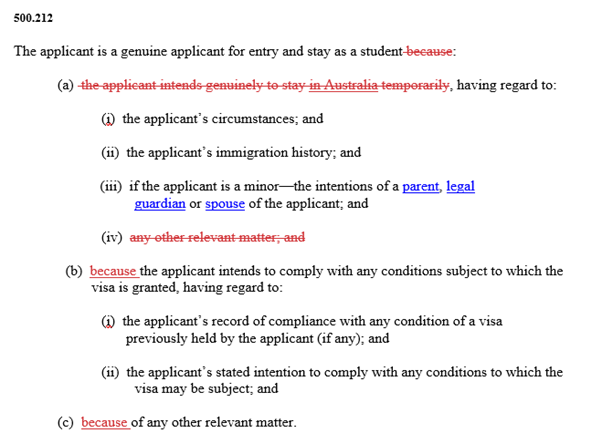
Newsletter 183
Genuine Temporary Entrant (GTE) requirement replaced with Genuine Student (GS) requirement
The Migration Amendment (Subclass 500 Visas) Regulations 2024 modify the Migration Regulations concerning Student (subclass 500) visas. One key alteration is the replacement of the Genuine Temporary Entrant (GTE) requirement with a Genuine Student (GS) requirement.
Effective from 23 March 2024, these changes come into effect. They apply to any application for a student (subclass 500) visa submitted on or after this date.

Visa Pre-application (Ballot) Acts commence 29 March 2024
The new provision introduced by the Act, Section 46C of the Migration Act, grants the Minister authority to organize a ballot concerning one or more visas. This includes the power for the Minister to issue a determination, in the form of a legislative instrument subject to disallowance, outlining the eligibility criteria for participating in a ballot and the procedures for conducting it. Additionally, the Act amends Section 46 of the Migration Act to clarify that visa application criteria specified in regulations, typically found in Schedule 1 to the Migration Regulations, may include a prerequisite of being selected in a ballot.
The Migration (Visa Pre-application Process) Charge Act 2023 (the Charge Act) pertains to imposing a fee on registering as a participant in a visa pre-application process. The Charge Act permits regulations to specify different fee amounts for various ballots or classes of ballots, as well as for different groups of individuals. Notably, the Charge Act establishes a maximum fee ceiling of $100 (AUD) for a specific ballot, with provision for automatic adjustment of this ceiling based on annual fluctuations in the Consumer Price Index.
Both the Amendment Act and the Charge Act form the legislative framework for the visa pre-application process (ballot) and received assent on 26 October 2023. This legislation comes into effect on 29 March 2024, with the Charge Act taking effect immediately thereafter.
New SC 192 Pacific Engagement visa
A novel Subclass 192 (Pacific Engagement) visa, known as the Pacific Engagement visa, is introduced, providing a pathway to permanent residency in Australia for nationals of select Pacific Island countries and Timor-Leste. Eligibility for this visa is determined through a random selection process conducted in alignment with a visa pre-application procedure specific to each country.
Effective from 29 March 2024, key characteristics of this permanent visa subclass include:
Schedule 1:
- Base application fee: $325 (AUD), with an additional applicant charge of $80 (AUD).
- Applicants may be located either inside or outside Australia.
- Those within Australia must hold a substantive visa, Bridging Visa A, B, or C.
- Family unit members must lodge a combined application; hence, secondary criteria cannot be pursued after the primary applicant has been granted a Subclass 192 visa.
- Primary applicants must fulfill the following criteria:
- Be selected participants in a visa pre-application process (ballot).
- Be aged over 18 and under 45 at the start of the visa pre-application process registration period.
- Hold a valid passport issued by a relevant country during registration.
- Either the applicant or their parent must be born in a country specified in the relevant visa pre-application process determination.
- Be citizens of a country related to the visa pre-application process, excluding New Zealand citizens.
- Submit the visa application by the specified date indicated in the selection notice.
Schedule 2:
- Primary or secondary applicants (spouses or de facto partners) must possess a written offer for ongoing employment in Australia, meeting specific criteria:
- The offered position must be genuine and in Australia.
- Employment terms must not be less favorable than those for Australian citizens in equivalent roles at the same location.
- No adverse information about the employer or associated parties known to immigration authorities, or any adverse information deemed reasonable to disregard.
- Demonstrated ability to financially support themselves and any secondary applicants for the first 12 months in Australia as visa holders.
Applicants demonstrating proficiency in English, such as through prior work or study experience in English-speaking environments or by satisfying approved English language tests, may be exempt from further English assessments. Alternatively, they can undertake the Australian Migrant English Program (AMEP) free of charge or meet English test requirements specified in legislative instruments if they do not meet the aforementioned criteria.
Under the “one fails all fails” principle, if any member of the applicant’s family unit fails to meet a relevant public interest criterion, the primary applicant will also fail to meet the primary criteria, regardless of whether the family member is applying for a Subclass 192 visa.
Applicants may be inside or outside Australia at the time of visa grant.
Pacific Engagement visa (subclass 192) pre-application (ballot) charge
The fee for enrolling as a registered participant in a ballot for the recently introduced Pacific Engagement visa (subclass 192) amounts to $25 (AUD). This fee is mandatory and must be settled upon registration. Failure to pay the fee during registration results in the individual being deemed never to have been registered as a participant in the visa pre-application process.
This provision takes effect on 29 March 2024.
PALM Scheme Family Tax Benefit
The specification outlines that individuals participating in the Pacific Australia Labour Mobility scheme (referred to as the PALM scheme) and granted approval for family accompaniment, along with their relevant family members, constitute designated groups for the purpose of determining eligibility for family tax benefits as per the provisions of the A New Tax System (Family Assistance) Act 1999.
Furthermore, the Determination designates the subclass 403 (Temporary Work)(International Relations) visa in the PALM stream, as well as the now-defunct Pacific Labour Scheme (PLS) stream, to include the duration during which an individual holds such a visa towards fulfilling the waiting period for family tax benefit Part A applicable to newly arrived residents.
This directive became effective on 20 March 2024.
Student (subclass 500) and Temporary Graduate (subclass 485) English language increase
The Department has distributed a document to Education Providers, informing them of alterations to the English language criteria for Student (subclass 500) visas and Temporary Graduate (subclass 485) visas. These modifications affect all applications for Student and Temporary Graduate visas submitted on or after 23 March 2024.
The document outlines the following:
Student visas (subclass 500):
- The minimum score required for the English proficiency criterion rises from International English Language Testing System (IELTS) 5.5 to 6.0 (or its equivalent).
- The minimum score for enrollment in a packaged English Language Intensive Course for Overseas Students (ELICOS) increases from IELTS 4.5 to 5.0 (or its equivalent).
- Students enrolled in recognized university foundation or pathway programs that offer accredited English language instruction need a minimum score of IELTS 5.5 (or its equivalent). These approved courses will be listed on the Department’s website.
- There will be no alteration for students solely pursuing English studies through ELICOS.
Temporary Graduate visas (subclass 485):
- The minimum required score rises from IELTS 6.0 to 6.5 (or its equivalent), with a minimum score of 5.5 required for each component of the test (reading, writing, speaking, and listening).
- Holders of passports from Hong Kong and British National Overseas (BNO) are exempt from meeting the increased minimum English language requirement. Their requirement remains at IELTS 6.0 (or its equivalent), with a minimum score of 5.0 for each component of the test (reading, writing, speaking, and listening).
The validity period for all Temporary Graduate visa applications decreases from three years to one year. Applicants must furnish evidence that they have completed an English language test within one year immediately preceding the date of the visa application.
A-UKFTA 4 year SC 482 visa
The Department has recently revised its website to indicate that a subclass 482 visa may be issued for a duration of four years if the applicant is a citizen, national, or permanent resident of the United Kingdom and falls under the categories of intra-corporate transferee, independent executive, or contractual service supplier. Furthermore, the Department has clarified that their interpretation of “contractual service supplier” encompasses all other individuals not explicitly covered by the categories of Intra-Corporate Transferee (ICTO) within a specific trade agreement.
Uber class action settles for $272m after 5-year battle
Over 8,000 Australian taxi operators who suffered financial losses and saw declines in license values when Uber entered the Australian market have reached a compensation agreement following Uber’s acceptance of a substantial $271.8 million settlement today, Monday, 18 March.
The legal action, initiated by Maurice Blackburn in 2019 and filed in the Victorian Supreme Court, stemmed from consultations with numerous individuals and organizations who claimed they were adversely affected by what was deemed Uber’s “unlawful entry” into the Australian market. Maurice Blackburn had asserted that the class action aimed to hold the rideshare platform accountable for adversely impacting the livelihoods of thousands of taxi, hire car, charter vehicle, and limousine drivers, as well as license owners nationwide.
Originally scheduled to commence today, Monday, 18 March, the court proceedings were canceled after Uber agreed to the settlement, marking it as one of the most successful class actions against Uber globally and the fifth largest in Australian legal history, according to Maurice Blackburn Lawyers principal Michael Donelly.
Donelly highlighted the strenuous legal battle waged over the course of five years, with Uber resisting compensation at every turn. However, he noted that Uber ultimately relented on the courthouse steps, acknowledging the collective effort of everyday Australians in confronting the corporate giant.
The settlement, as reported by the ABC, will see Maurice Blackburn’s legal fees estimated between $30 million and $35 million, with the remaining sum to be distributed among the group members. Donelly emphasized the significance of this successful resolution, particularly in light of previous unsuccessful cases against governments in Victoria, Queensland, and Western Australia.
Donelly expressed gratitude for the trust placed in Maurice Blackburn by the thousands affected and emphasized the firm’s commitment to holding major corporations accountable for perceived injustices. The settlement remains subject to approval by the Supreme Court.
Related posts
Newsletter 201
ACT The Australian Government has allocated 1,800 nomination places to the ACT for the 2024-25 progr
Newsletter 200
Business Innovation and Investment Program (BIIP) (Sc 188) Closure The Migration Regulations 1
Newsletter 199
VETASSESS Updates Accepting application for Electrician & Metal Machinist Starting 15 July 2




